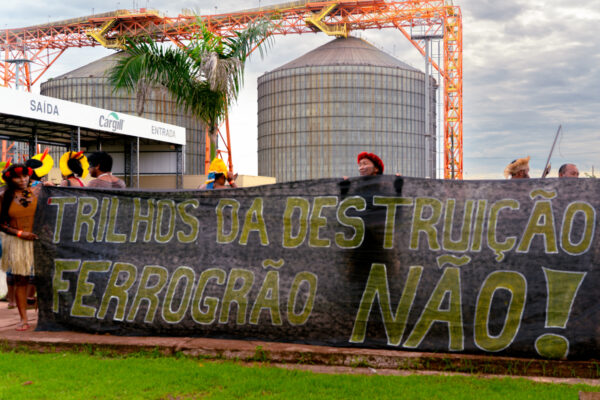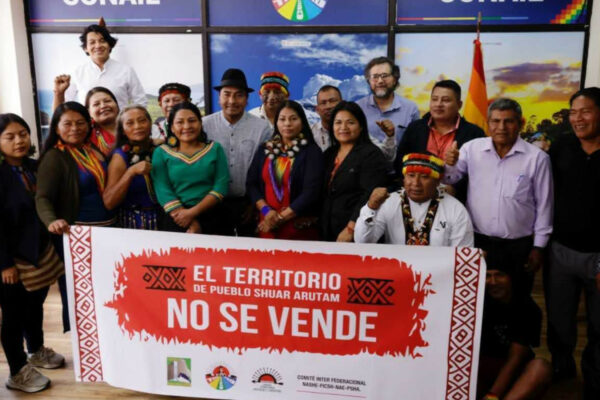A critical element to our End Amazon Crude campaign is to challenge and cut off international financing for oil extraction in the Amazon.
Last week, Amazon Watch staff accompanied a delegation of Indigenous leaders from the Peruvian Amazon to New York City to confront major U.S. banks Goldman Sachs, Citi, and JPMorgan Chase. The delegation sought to urge these financial institutions to cease new financial support for Petroperú as a client.
Petroperú is seeking support for controversial oil expansion efforts in the Amazon and the northern coast of Peru, starkly contradicting the global scientific mandate to halt oil exploration, which directly threatens Indigenous peoples. Petroperú is reeling financially and desperate to secure international funding. However, Indigenous leadership emphasize that there is no future for oil extraction in the Peruvian Amazon.
There is nothing more powerful than hearing directly from those most affected by oil extraction. Even more so when they are the elected leaders representing Indigenous nationalities with thousands of years of history stewarding some of the most biodiverse and important biospheres on Earth.
Olivia Bisa, first woman president of the Chapra Nation, Senar Irar, president of the Achuar People, and Neil Encinas, a leader of the Wampís Nation, represent Indigenous communities most directly affected by oil extraction and whose territories overlap the contentious Block 64, where Petroperú has intention to drill.
Carlos Chapilliquen Panta, an elected fisherfolk delegate from the fishing community of Cabo Blanco, also joined the meetings virtually. His home is also threatened by new oil drilling to feed Petroperú’s Talara Refinery, which puts at further risk biodiverse aquatic ecosystems and subsequently the livelihoods of fishing communities who reside there.
Together, they advocated on behalf of the MarAmazonía Alliance, a growing coalition composed of seven Indigenous nations from the Amazon and dozens of fisherfolk organizations from the north Peruvian coast.
The delegation made it crystal clear to bank executives and the international stage: “We will not permit new oil extraction. Ever.”
To bolster the delegation’s calls, Amazon Watch released a report titled “Assessing Petroperú’s Financial, Legal, Environmental, and Social Risks” revealing the heightened risks associated with supporting Petroperú. The report reinforces that new investments in the company, in any capacity, will likely to drive more oil production, necessary to offset the staggering costs of the $6.5 billion Talara Refinery, much of which is composed of debt incurred from commercial banks through loans and bonds.
This massive indebtedness forces Petroperú to bring all the oil they can to its refinery, as quickly and cheaply as possible. For this reason, the company has launched an international campaign seeking investor support and additional operating partners to open new oil fields along the north Peruvian coast and Peruvian Amazon, despite significant environmental and community opposition, notably from the MarAmazonía Alliance.
Since Petroperú needs to open new oil blocks to pay existing debts, any new financial backing will further jeopardize Indigenous rights, promote social conflicts, pose threats to the environment, and threaten the reputation of the banks which outwardly herald climate and rights commitments.
And so, despite warnings from impacted communities about the implications of new financing for Petroperú, banks like JPMorgan were linked to a new $1 billion bond for the oil company.
With help from Amazon Watch supporters to push meeting requests with the banks, the delegation was able to meet with representatives from Goldman Sachs and Citi in New York, to share their testimonies, present information from the ground about the impacts of their financial support for the Peruvian oil industry, and explain how to avert the escalation of criminalization and hostilities against Indigenous and community leaders opposing oil operations.
Senar Irar talks about this visit, stating that, “We have traveled (to the United States) from far away to explain to the banks that have invested in Petroperú that this company is trying to open new oil wells in our territories in order to pay them back. The desperation to pay back the money loaned by the banks for the construction of their refinery is causing conflicts and even death threats among those of us who reject the activity.”
The delegation’s meeting with Citi came right before its Annual General Meeting (AGM), where it faced intense investor scrutiny over a shareholder resolution that sought more transparency about the bank’s Indigenous rights policies, such as free, prior, and informed consent. The resolution attracted sizable investor support, at 26%, highlighting the bank’s sensitivity to Indigenous rights issues associated with its clients and business.
Olivia Bisa called out the dissonance between the banks’ public commitments and their actions. She criticized Citi for not holding its clients accountable to international standards of Free, Prior, and Informed Consent (FPIC), stating, “Citi talks about respecting the Free, Prior and Informed Consent of Indigenous communities as set down by the U.N., but it has clients like Petroperú which refuse to recognize the right to say no of seven Indigenous nations in the Peruvian Amazon.”
In an unexpected and unusual move, JPMorgan Chase canceled a scheduled in-person meeting with the Amazon Indigenous leaders. The bank states that its “terms for the meeting” were not met and preferred that the existence of the meeting should be kept in total secrecy. This cancellation happened just days before the slated meeting time in Washington, DC and the delegation’s arrival to the United States.
This about-face was unacceptable to the official delegates. Neil Encinas said in response: “The more than 85 communities that make up the integral territory of the Wampís Nation oppose the entry of oil operations into their territories. In our territory we suffered the irresponsibility of Petroperú in the past, which caused the largest oil spill in all of Latin America. Now we face a new threat. Petroperú needs to activate oil wells in our territory to pay the debts it has acquired from commercial banks such as JPMorgan Chase.”
The bank’s response was also immediately met with criticism from its investors, and it underscored the bank’s reluctance to address these issues with greater transparency. Only time will tell whether this last-minute switch and refusal to meet is an indicator of JPMorgan’s plans in Peru. Chase, like Citi, faces a similar shareholder resolution for its AGM in late May calling for greater transparency about its Indigenous rights policies and due diligence.
As some of the largest financiers of the fossil fuel industry on the planet, banks must follow the global scientific mandate not to financially support new oil expansion and clients that are currently or plan to drill new oil blocks. Banks must also be held accountable for providing or facilitating billions in dollars of debt for oil companies – debt which ultimately might incentivize further violence and aggression against Indigenous and local communities that say no to such oil activities.
A decision to pump more capital into Petroperú, a company that needs to open up new oil blocks in Indigenous territories, drives the entire country into a scenario of deeper debt and social unrest, obstructing any plans for Peru to make a just transition out of fossil fuels. Banks previously involved in Petroperú, especially those who refuse to hear directly from the delegates, must not ignore the long-term implications of its business, and must prohibit any new financing for its client and others like it.
The delegation’s efforts to hold financial institutions accountable represent a critical front in the battle against climate change and corporate complicity in environmental degradation and violence against Earth defenders. This delegation’s visit to New York and Washington, DC is not just a plea for action – it’s a demand for immediate change and responsibility from the world’s leading financial players.
Now, we enter into a new phase of escalated confrontation between the oil industry and the MarAmazonía Alliance, while in the backdrop, the Peruvian government seeks new investor support and operational partners to drill in Block 64, which overlaps the territories of the Achuar, Wampís, and Chapra.
Amazon Watch will continue to work closely with these communities as our End Amazon Crude campaign and Amazon Defenders Fund provide direct support and advocacy to strengthen internal security measures, bolster social structures, and contribute to economic alternatives to sustain their ways of life – free from highly extractive industries.


















